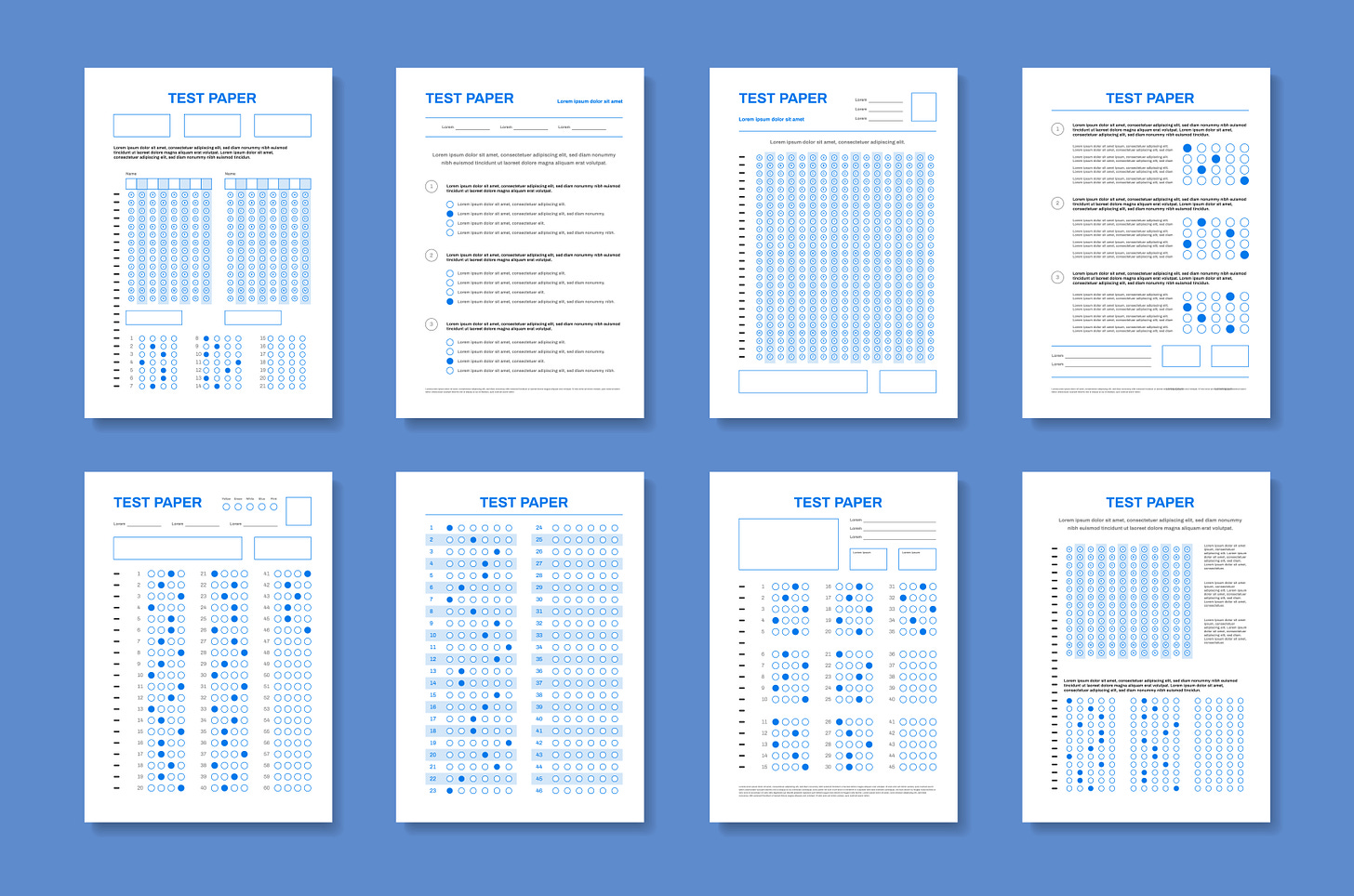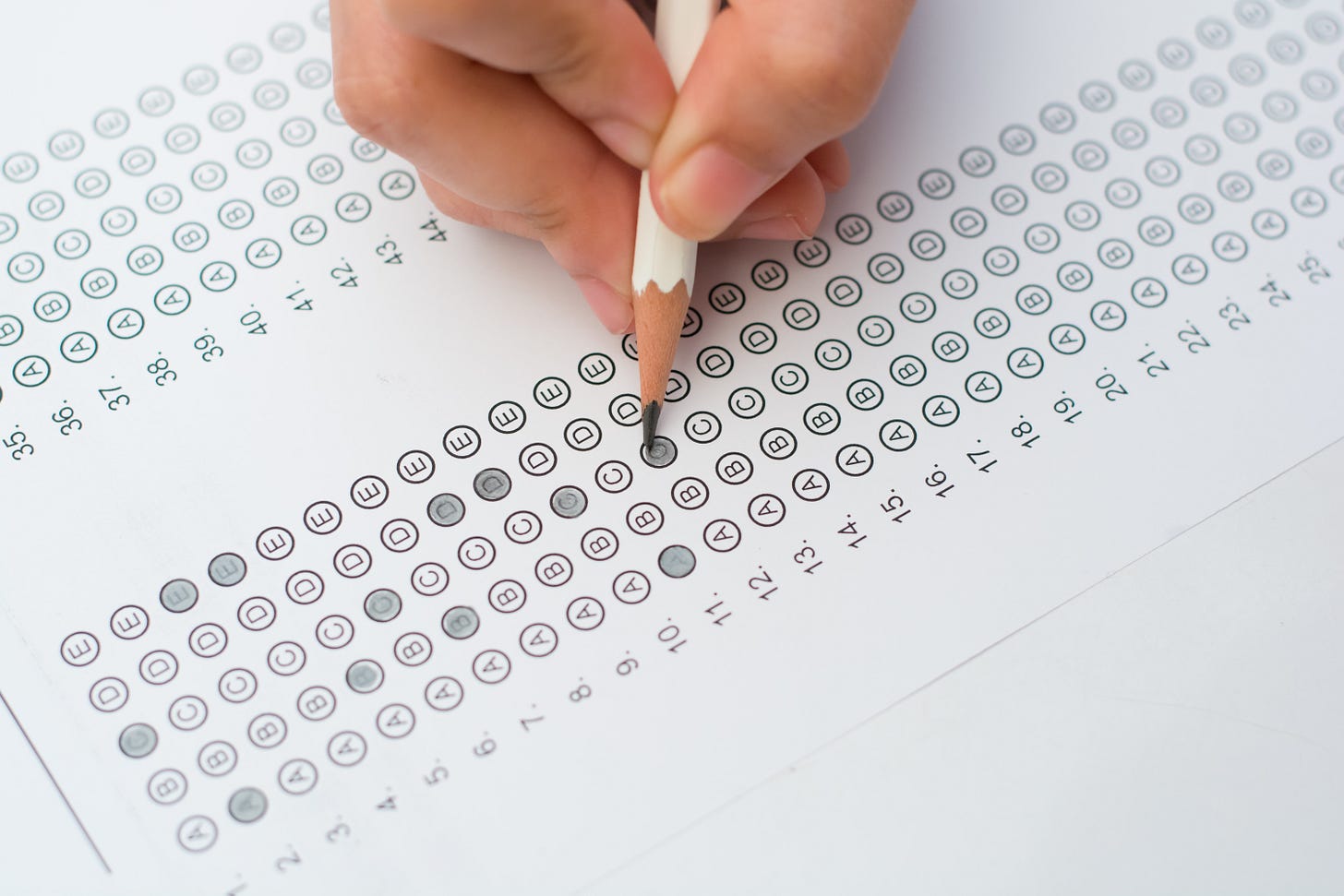5 tips to start acing multi-choice (MCQs) tests and exams
MCQs are not always easy. It's essential to have the right strategy.
Hi there,
As the title suggests this post is to give your teen a strategy for tackling multi-choice tests and exams, or MCQs for short.
MCQs masquerade as being simple. Oh cool I don’t have to write anything I just circle an answer.
But, they can be just as difficult as a written exam.
Despite their seemingly simple format, they should not be a cue for your teen to switch off and think they don’t need to prepare.
Far from one-dimensional
Just because the answer has to be one of the options given, does not mean that MCQs are always easy.
For instance, MCQs can be really sneaky by:
making at least 2 of the possible options so similar it’s hard to pick which is the correct one;
providing answers in the double negative;
providing answers like (d) and (e), (a) but not (b), everything but (c);
giving multiple answers which are all to an extent correct, forcing you to choose the ‘best fit’ or the most correct.
Unlike normal tests, where you either know the answer or you don’t, MCQs force you to read through five or so possible answers — none of which may fit with the answer that initially comes to mind.
On top of this, the clock is normally against you. Often you will only have around 1 minute per question, so if you’re stuck on something you better think fast!
So, MCQs, definitely not always easy.
To help prepare your teen for MCQs here are 5 pointers you can share with them that I found really helpful.
1. If you’re stuck, move on
My first suggestion for your teen is that they answer the easy questions first. (I cover this in detail in this post.)
This is like going for a warm up jog. After a little while you’re ready to move into the next gear.
Applying this strategy for MCQs (and in fact all types of tests and exams, which I cover in this post in detail) can really save your bacon. As mentioned, MCQs can be particularly time-pressured, so it is really important that your teen doesn’t waste too much time pondering questions they might never know the answer to. Much better to move on and pick up all of the marks you can.
Once your teen has answered all that they can easily they should then go back to the harder ones. They are much more likely to be ‘in the zone’ by that stage and ready to answer the harder questions.
2. Don’t read the answers first
Some students like to adopt the strategy of reading the answer options first. In my view this is not particularly efficient.
Most of us, if we read the answers first, would then read the question, only to have forgotten the answer choices.
It’s usually more time-favourable to read the question first and then the answers will have context.
3. Figure out how long each question should take beforehand
Students who do well in exams know beforehand approximately how long they have to answer each question.
For instance if your teen has 60 questions to answer in one hour, they should be sticking to a pace of one minute per question.
Some questions will take longer to answer, some they will hopefully be able to answer straight away. The point is they can’t let time get too far away from them.
I used to keep an eye on the clock after blocks of questions, for instance every 20 questions I would check I wasn’t getting too far behind.
Linking back to poin 1 above, if your teen finds themselves pouring over a question for more than 2 minutes say, it’s probably best to move on and come back to it if they have time.
Your teen can only get marks for questions they actually answer.
4. Cross out the wrong answers
Whenever your teen is able to write on their test papers (sometimes this is allowed sometimes not) they might find it helpful to cross off the answers they know are wrong.
The process of elimination comes into play a lot in MCQs, and it can help a lot if you clearly cross out the wrong answers so your brain is left to ponder only the remaining options.
5. Scribble stuff down before it goes away
I used to find in tests and exams that sometimes a useful piece of information would pop into my head, only to leave as quickly as it came.
So when a juicy titbit of knowledge pops into your teens head that will help them answer a question later on, or a question they know they need to go back to, I suggest they scribble it down asap before it disappears.
I hope that utilising these techniques for themselves will help your teen to ace their multi-choice tests and exams, and that they will be able to avoid the common and unpleasant post-match exam debrief of “uh oh, I thought that was going to easy…”
Thanks so much for reading.
Clare




